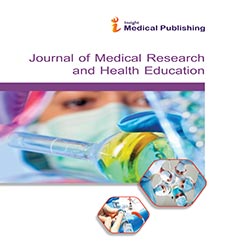Editor's Note: A World Urging for Medical Help
Department of Experimental, Diagnostic and Specialty Medicine, University of Bologna, Bologna, Italy
- *Corresponding Author:
- Laura Cercenelli
Department of Experimental
Diagnostic and Specialty Medicine
University of Bologna, Bologna, Italy
Tel: 3498635762
E-mail: laura.cercenelli@unibo.it
Received Date: 24 March 2020 Accepted Date: 10 April 2020 Published Date: 17 April 2020
Citation: Cercenelli L (2020) Editor’s Note: Journal of Medical Research and Health Education. J Med Res Health Educ. Vol.4 No.1: 2.DOI:10.36648/healthcare.4.2.1
Copyright: © 2020 Cercenelli L. This is an open-access article distributed under the terms of the Creative Commons Attribution License, which permits unrestricted use, distribution, and reproduction in any medium, provided the original author and source are credited.
Abstract
Medical research is research conducted with human subjects, or material of human origin, in which the researcher directly interacts with human subjects. Medical research helps doctors and researchers to find new and better ways to understand, detect, control, and treat illness. A medical research study is a way to find answers to difficult scientific or health questions.
Editor’s Note
Medical research is research conducted with human subjects, or material of human origin, in which the researcher directly interacts with human subjects. Medical research helps doctors and researchers to find new and better ways to understand, detect, control, and treat illness. A medical research study is a way to find answers to difficult scientific or health questions. For example, the study might explore the best ways to treat people with colon cancer. By studying cancer cells from patients, researchers may be able to determine the specific genetic mutations (changes in gene sequence) that caused the normal, healthy cells to become cancerous, and may help doctors decide on the best drugs to prescribe or surgeries to perform. Medical research today may help other doctors in the future screen their healthy patients before they ever develop cancer.
It seems to happen almost every day - you hear about the results of a new medical research study. Sometimes the results of one study seem to disagree with the results of another study. It's important to be critical when reading or listening to reports of new medical findings. Some questions that can help you evaluate health information include: Was the study in animals or people? Does the study include people like you? How big was the study? Was it a randomized controlled clinical trial? Where was the research done? If a new treatment was being tested, were there side effects? Who paid for the research? Who is reporting the results? What kind of risks does it carry? Are those low level or high level risks? Is it possible to prevent risks?
Risks are all around us. A nearby sneeze may raise your risk for catching the flu. Obesity boosts the odds you’ll get diabetes. Smoking increases your risk for many cancers. And if you pay attention to news headlines, you may worry that you’re at risk for food poisoning, Zika infection, shark attacks, and more. How can you know which health risks apply to you? Health risks can sometimes be confusing, but they’re important to understand. Knowing the risks you and your family may face can help you find ways to avoid health problems. It can also keep you from fretting over unlikely threats. Knowing the risks and benefits of a medical treatment can help you and your doctor make informed decisions.
A health risk is the chance or likelihood that something will harm or otherwise affect your health. Risk doesn’t mean that something bad will definitely happen. It’s just a possibility. Several characteristics, called risk factors, affect whether your health risks are high or low. Your personal health risk factors include your age, sex, family health history, lifestyle, and more. Some risks factors can’t be changed, such as your genes or ethnicity. Others are within your control, like your diet, physical activity, and whether you wear a seatbelt.
Talking about health risks can seem intimidating. Even doctors sometimes have trouble with risk concepts. That’s why the Journal of Medical Research and Health Education, provides a platform for various medical researchers to showcase their studies on health risks and also about various other diseases that outbreak out of nowhere. To a world suffering from pandemic deadly diseases caused by viruses, it is important for us to communicate preventive strategies not only to the patients but also to the public.
We take this note as an opportunity, to acknowledge and appreciate all the clinicians across the world that pour continuous efforts in finding solution for many pandemic outbreaks. We also take this as an opportunity to appreciate researchers for their immense contribution for the scientific community.
Open Access Journals
- Aquaculture & Veterinary Science
- Chemistry & Chemical Sciences
- Clinical Sciences
- Engineering
- General Science
- Genetics & Molecular Biology
- Health Care & Nursing
- Immunology & Microbiology
- Materials Science
- Mathematics & Physics
- Medical Sciences
- Neurology & Psychiatry
- Oncology & Cancer Science
- Pharmaceutical Sciences
